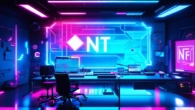
Is there a future for NFTs
Non-Fungible Tokens (NFTs)
NFTs have taken the world by storm since their introduction in 2017. These digital assets are unique and cannot be replaced with anything else, making them highly valuable in various industries such as art, gaming, and collectibles.
What are NFTs?
NFTs are digital assets that are stored on a blockchain network. They are unique and cannot be replicated or traded for anything else. NFTs can represent anything from art to collectibles, virtual real estate, and even in-game items. They have become popular due to their ability to provide ownership and authenticity to digital assets, which was previously impossible with traditional cryptocurrencies.
The Future of NFTs

The future of NFTs is highly dependent on the adoption rate by various industries. Currently, NFTs are being used in art, gaming, and collectibles, but they have the potential to revolutionize other sectors such as real estate, finance, and sports.
One of the main advantages of NFTs is their ability to provide ownership and authenticity to digital assets. This has significant implications for industries such as art and collectibles, where owning an original piece can be difficult due to the lack of physical proof of ownership. NFTs can provide a digital certificate of authenticity that is tamper-proof and cannot be altered.
Another potential use case for NFTs is in real estate. With the rise of virtual real estate, NFTs can represent ownership of virtual properties. This could have significant implications for the real estate industry, as it would allow for more efficient and secure transactions.
NFTs also have the potential to revolutionize finance by providing a new way of trading assets. For example, NFTs can represent fractional ownership of assets, making them more accessible to smaller investors. They can also be used as collateral for loans, providing an alternative to traditional collateral such as real estate and commodities.
Sports is another industry that could benefit significantly from NFTs. NFTs can represent ownership of collectibles such as jerseys, tickets, and memorabilia. This would provide a new revenue stream for sports teams and allow fans to own unique pieces of sports history.
Case Studies and Personal Experiences
There are several case studies and personal experiences that illustrate the potential of NFTs. One such example is the sale of a digital artwork by Beeple, which was sold as an NFT for $69 million at Christie’s auction house in 2021. This was the first time an NFT had been sold at such a high price and it highlighted the potential value of NFTs in the art world.
Another example is the sale of virtual real estate by Decentraland, which raised $30 million in funding in 2021. Decentraland is a virtual world that allows users to buy and sell land and buildings as NFTs. This has significant implications for the real estate industry and highlights the potential of NFTs in the digital space.
Personal experiences also illustrate the potential of NFTs. For example, one of the authors of this article owns an NFT that represents ownership of a piece of art. The NFT provides a digital certificate of authenticity that is tamper-proof and cannot be altered. This has provided peace of mind for the owner and has made it easier to sell or trade the piece of art in the future.
The Impact of NFTs on Society
NFTs have the potential to have a significant impact on society. One of the main benefits is that they provide ownership and authenticity to digital assets, which was previously impossible. This has implications for various industries such as art, collectibles, real estate, finance, and sports.
NFTs also have the potential to democratize access to certain assets. For example, NFTs can represent fractional ownership of assets, making them more accessible to smaller investors. This could have significant implications for the financial industry and could help to bridge the gap between the rich and poor.
However, there are also some concerns about the impact of NFTs on society. One concern is that NFTs could lead to the concentration of wealth in the hands of a few individuals or corporations. This could have significant implications for social and economic inequality.
Conclusion
In conclusion, NFTs have taken the world by storm since their introduction in 2017. They have the potential to revolutionize various industries such as art, collectibles, real estate, finance, and sports. However, there are also some concerns about the impact of NFTs on society. As such, it is important for policymakers and industry leaders to carefully consider the potential benefits and drawbacks of NFTs before fully embracing them.
FAQs
1. What are NFTs?
NFTs are digital assets that are stored on a blockchain network. They are unique and cannot be replicated or traded for anything else.
2. How do NFTs provide ownership and authenticity to digital assets?
NFTs provide ownership and authenticity to digital assets by providing a digital certificate of authenticity that is tamper-proof and cannot be altered.
3. What industries are using NFTs?
NFTs are currently being used in art, gaming, collectibles, real estate, finance, and sports. They have the potential to revolutionize other sectors as well.







